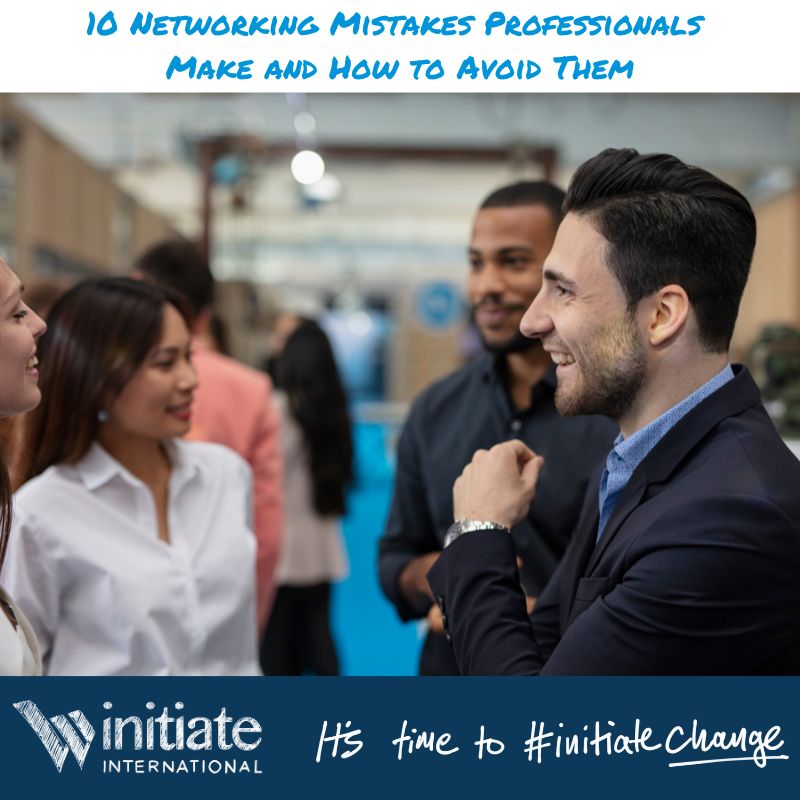Professional networking is one of the most powerful tools for career growth, yet many people unknowingly sabotage their efforts by making avoidable mistakes. Whether you’re attending industry events, connecting online, or simply chatting over coffee, how you approach networking can make or break your professional relationships.
Let’s explore ten common networking mistakes professionals make and how to steer clear of them.
1. Waiting Until You Need Something
A common misstep is only reaching out to your network when you need a favour, job lead or recommendation. This reactive approach can come across as opportunistic. Instead, make networking a regular habit. Engage with peers, mentors and industry contacts consistently, even when you’re not actively seeking anything. Building relationships early lays the groundwork for genuine support when you do need it.
2. Being Too Transactional
Networking should never feel like a cold exchange of business cards. If your conversations are focused solely on what you can gain, people will quickly lose interest. Shift your mindset from transactional to relational. Ask thoughtful questions, show interest in others’ work and offer help where you can. Authenticity builds trust and long-term connections.
3. Forgetting to Follow Up
You’ve had a great chat at an event or connected with someone online, but then silence. No follow-up, no message, no thank-you. This is a missed opportunity to solidify the connection. A simple follow-up message within a day or two can make all the difference. It shows professionalism and genuine interest and keeps the conversation going.
4. Ignoring Online Networking
In today’s digital-first world, neglecting platforms like LinkedIn is a major oversight. Many professionals fail to update their profiles or engage with others online. Your digital presence is an extension of your professional brand. Keep your profile current, share relevant content and interact with others in your field. Online networking is just as valuable as face-to-face interaction.
5. Dominating the Conversation
Talking excessively about yourself can come across as self-centred. Networking is a two-way street and listening is just as important as speaking. Make space for others to share their experiences. Ask open-ended questions and be genuinely curious. You’ll not only learn more but also be remembered as someone who values others’ perspectives.
6. Using Generic Introductions
A vague introduction like “I work in marketing” doesn’t leave a lasting impression. People need to understand what you do and how you add value. Craft a clear and concise elevator pitch that highlights your expertise. For example, “I help small businesses grow through targeted digital campaigns” is specific and memorable.
7. Neglecting Your Existing Network
It’s easy to focus on making new connections and forget the ones you already have. But your current network is often your strongest asset. Stay in touch with former colleagues, classmates and mentors. A quick check-in or sharing a useful article can keep relationships warm and open the door to future opportunities.
8. Sending Impersonal Connection Requests
A generic “Let’s connect” message doesn’t cut it anymore. If you’re reaching out to someone new, especially online, take the time to personalise your message. Mention how you found them, why you’re interested in connecting or what you admire about their work. This small effort shows sincerity and increases your chances of a meaningful response.
9. Overlooking Body Language and Tone
In-person networking isn’t just about what you say, it’s also about how you say it. Your body language, eye contact and tone all influence how others perceive you. Smile, maintain eye contact and be approachable. These non-verbal cues convey confidence and warmth, making people more likely to engage with you.
10. Forgetting to Give Back
Networking isn’t just about what you can gain, it’s also about what you can offer. If you’re always taking and never giving, people will notice. Share job leads, make introductions or offer advice when you can. Giving back builds trust, strengthens your reputation and makes your network more willing to support you in return.
Final Thoughts
Networking is more than a career tool, it’s a mindset. By avoiding these common mistakes and focusing on authentic, respectful connections, you’ll build a network that supports your growth for years to come. Whether you’re just starting out or looking to level up, remember the best networkers are those who give as much as they get.






